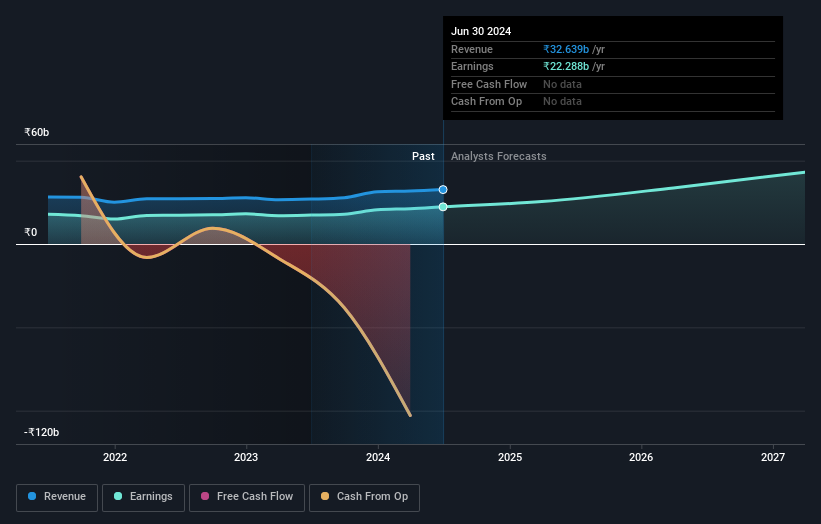- India
- /
- Diversified Financial
- /
- NSEI:HUDCO
While institutions own 14% of Housing and Urban Development Corporation Limited (NSE:HUDCO), state or government are its largest shareholders with 75% ownership
Key Insights
- Housing and Urban Development's significant state or government ownership suggests that the key decisions are influenced by shareholders from the larger public
- India owns 54% of the company
- Institutions own 14% of Housing and Urban Development
If you want to know who really controls Housing and Urban Development Corporation Limited (NSE:HUDCO), then you'll have to look at the makeup of its share registry. With 75% stake, state or government possess the maximum shares in the company. In other words, the group stands to gain the most (or lose the most) from their investment into the company.
And institutions on the other hand have a 14% ownership in the company. Insiders often own a large chunk of younger, smaller, companies while huge companies tend to have institutions as shareholders.
Let's delve deeper into each type of owner of Housing and Urban Development, beginning with the chart below.
See our latest analysis for Housing and Urban Development

What Does The Institutional Ownership Tell Us About Housing and Urban Development?
Institutions typically measure themselves against a benchmark when reporting to their own investors, so they often become more enthusiastic about a stock once it's included in a major index. We would expect most companies to have some institutions on the register, especially if they are growing.
We can see that Housing and Urban Development does have institutional investors; and they hold a good portion of the company's stock. This implies the analysts working for those institutions have looked at the stock and they like it. But just like anyone else, they could be wrong. It is not uncommon to see a big share price drop if two large institutional investors try to sell out of a stock at the same time. So it is worth checking the past earnings trajectory of Housing and Urban Development, (below). Of course, keep in mind that there are other factors to consider, too.

Hedge funds don't have many shares in Housing and Urban Development. India is currently the company's largest shareholder with 54% of shares outstanding. This implies that they have majority interest control of the future of the company. For context, the second largest shareholder holds about 21% of the shares outstanding, followed by an ownership of 8.4% by the third-largest shareholder.
Researching institutional ownership is a good way to gauge and filter a stock's expected performance. The same can be achieved by studying analyst sentiments. There is some analyst coverage of the stock, but it could still become more well known, with time.
Insider Ownership Of Housing and Urban Development
The definition of an insider can differ slightly between different countries, but members of the board of directors always count. Company management run the business, but the CEO will answer to the board, even if he or she is a member of it.
Insider ownership is positive when it signals leadership are thinking like the true owners of the company. However, high insider ownership can also give immense power to a small group within the company. This can be negative in some circumstances.
Our data cannot confirm that board members are holding shares personally. Given we are not picking up on insider ownership, we may have missing data. Therefore, it would be interesting to assess the CEO compensation and tenure, here.
General Public Ownership
With a 11% ownership, the general public, mostly comprising of individual investors, have some degree of sway over Housing and Urban Development. This size of ownership, while considerable, may not be enough to change company policy if the decision is not in sync with other large shareholders.
Next Steps:
While it is well worth considering the different groups that own a company, there are other factors that are even more important. Take risks for example - Housing and Urban Development has 2 warning signs (and 1 which shouldn't be ignored) we think you should know about.
But ultimately it is the future, not the past, that will determine how well the owners of this business will do. Therefore we think it advisable to take a look at this free report showing whether analysts are predicting a brighter future.
NB: Figures in this article are calculated using data from the last twelve months, which refer to the 12-month period ending on the last date of the month the financial statement is dated. This may not be consistent with full year annual report figures.
Valuation is complex, but we're here to simplify it.
Discover if Housing and Urban Development might be undervalued or overvalued with our detailed analysis, featuring fair value estimates, potential risks, dividends, insider trades, and its financial condition.
Access Free AnalysisHave feedback on this article? Concerned about the content? Get in touch with us directly. Alternatively, email editorial-team (at) simplywallst.com.
This article by Simply Wall St is general in nature. We provide commentary based on historical data and analyst forecasts only using an unbiased methodology and our articles are not intended to be financial advice. It does not constitute a recommendation to buy or sell any stock, and does not take account of your objectives, or your financial situation. We aim to bring you long-term focused analysis driven by fundamental data. Note that our analysis may not factor in the latest price-sensitive company announcements or qualitative material. Simply Wall St has no position in any stocks mentioned.
About NSEI:HUDCO
Housing and Urban Development
Provides loans and financing for housing and urban development projects in India.
High growth potential with proven track record.
Similar Companies
Market Insights
Community Narratives



